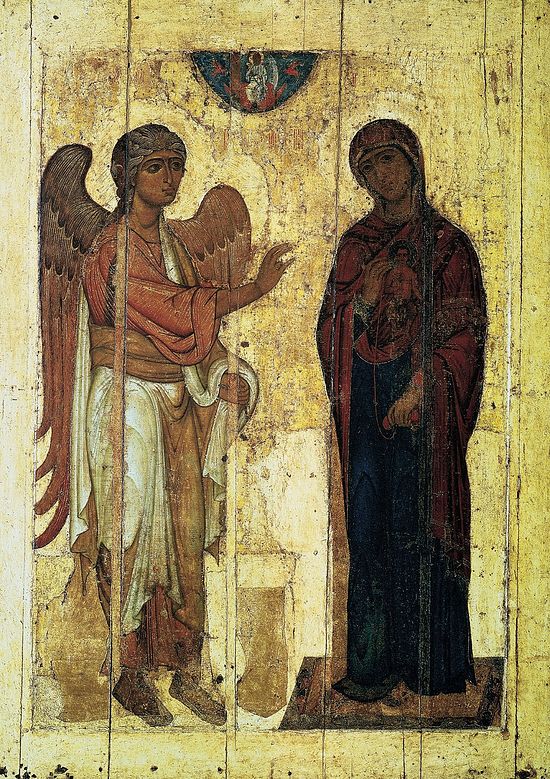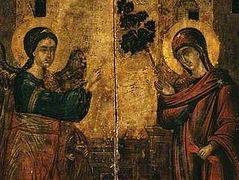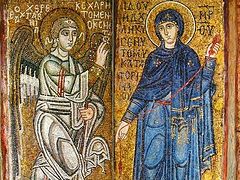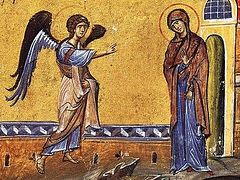The services for the feast of the Annunciation present a broad and profound exegesis of the Gospel reading on the Annunciation of the Archangel Gabriel to the Virgin Mary before she conceived in her most pure womb the incarnate Logos. The stichera and canon for the feast explain the Archangel’s greeting to the Most Holy Theotokos and her answer to this greeting (Lk. 1:26-38). Thanks to this exegesis the entire mystery and meaning of this event is presented to the faithful in all its universal significance.
St. Theophan, the metropolitan of Nicea, composed in the eighth century the canon of the feast in the form of a dialogue between the Archangel and the Most-Pure Virgin, deftly strewing Old Testament prophecies of the Incarnation. According to custom, at the service the canon of the feast is read by two readers (until the ninth canticle): one reading the troparia of the Angel, the other those of the Theotokos.
* * *
Tone Four
Canticle One
(Irmos) I shall open my mouth and the Spirit will inspire it, and I shall utter the words of my song to the Queen and Mother: I shall be seen radiantly keeping feast and joyfully praising her conceiving.
Most Holy Theotokos, save us.
Let thy forefather David sing to thee, O Lady, striking upon the harp of the Spirit: ‘Hearken, O Daughter,[1] to the voice of the Angel, for he discloses to thee joy past telling.’
The Angel
In gladness I cry to thee: incline thee ear and give heed unto me, as I tell thee of God’s conception without seed. For thou, O Most Pure, hast found grace before the Lord such as no other woman ever found.
The Theotokos
O Angel, help me to understand the meaning of thy words. How shall what thou sayest come to pass? Tell me clearly, how shall I conceive, who am a virgin maid? And how shall I become the Mother of my Maker?
The Angel
Thou dost think, so it seems, that I utter words deceitfully; and I rejoice to see thy prudence. But take courage, O Lady: for when God wills, strange wonders are easily accomplished.
(Katavasia) I shall open my mouth …
Canticle Three
(Irmos) O Mother of God, thou living an plentiful fount, give strength to those united in spiritual fellowship, who sing hymns of praise to thee: and on this feast of thy holy conceiving vouchsafe unto them crowns of glory.
The Theotokos
There is no more a prince from Judah’s line,[2] but the time is at hand in which Christ, the hope of the Gentiles, shall appear. But do thou make plain to me how I, being a virgin, shall bear Him?
The Angel
O Virgin, thou dost seek to know from me the manner of thy conceiving, but this is beyond all interpretation. The Holy Spirit shall overshadow thee in His creative power and shall make this come to pass.
The Theotokos
My mother Eve, accepting the suggestion of the serpent, was banished from divine delight: and therefore I fear thy strange salutation, for I take heed lest I slip.
The Angel
I am sent as the envoy of God to disclose to thee the divine will. Why are thou, O Undefiled, afraid of me, who rather am afraid of thee? Why, O Lady, dost thou stand in awe of me, who stand in reverent awe of thee?
(Katavasia) O Mother of God, thou living and plentiful fount …
Sessional hymn, Tone eight
The Word of God is now come down upon earth. The Angel stood before the Virgin and cried aloud: ‘Hail, blessed Lady, who alone among women hast preserved the seal of thy virginity, while yet receiving in thy womb the pre-eternal Word and Lord, that He as God may save mankind from error.’
Glory … Both Now …
Repeat.
Canticle Four
(Irmos) He who sits in glory upon the throne of the Godhead, Jesus the true God, is come in a swift cloud,[3] and with His pure hand He has saved those who cry: Glory to Thy power, O Christ.
The Theotokos
 The Prophet Isaiah
The Prophet Isaiah
The Angel
The bush that burnt with fire and yet remained unconsumed,[5] disclosed the secret mystery that shall come to pass in thee, O pure Maiden, full of grace. For after child-birth thou shalt remain ever-Virgin.
The Theotokos
O Gabriel, herald of the truth, shining with the radiance of Almighty God, tell me truly: how shall I, my purity remaining untouched, bear in the flesh the Word that has no body?
The Angel
I stand before thee in fear, as a servant before his mistress, and in awe I am afraid to look at thee now, O Maid. In His good pleasure shall the Word of God descend upon Thee, as dew upon the fleece.[6]
(Katavasia) He who sits in glory upon the throne of the Godhead …
Canticle Five
(Irmos) The whole world was amazed at thy divine glory: for thou, O Virgin who hast not known wedlock, hast held in thy womb the God of all, and hast given birth to an eternal Son, who rewards with salvation all who sing thy praises
The Theotokos
I cannot understand the meaning of thy words. For there have often been miracles, wonders worked by the might of God, symbols and figures contained in the Law. But never has a virgin borne child without knowing a man.
The Angel
Thou art amazed, O all-blameless Virgin; and amazing indeed is the wonder that comes to pass in thee: for thou alone shalt receive in thy womb the King of all who is to take flesh. It is thou who art prefigured by the utterances and dark sayings of the prophets and by the symbols of the Law.
The Theotokos
How can He whom nothing can contain, upon whom none can gaze, dwell in the womb of a virgin whom He Himself has formed? And how shall I conceive God the Word, who with the Father and the Spirit has no beginning?
The Angel
He who promised to thy forefather David that of the fruit of his body He would set upon the throne of his kingdom,[7] He it is that has chosen thee, the only excellency of Jacob,[8] as His spiritual dwelling-place.
(Katavasia) The whole world was amazed at thy divine glory …
Canticle Six
(Irmos) Prefiguring Thy three-day burial, the prophet Jonah cried out in the belly of the whale: ‘Deliver me from corruption, O Jesus, King and Lord of hosts.’
The Theotokos
Receiving thy glad tidings, O Gabriel, I am filled with divine joy. For thou dost speak to me of joy, a joy without end.
The Angel
Divine joy is given to thee, O Mother of God. All creation cries unto thee: ‘Hail, O Bride of God.’ For thou alone, O pure Virgin, wast foreordained to be the Mother of the Son of God.
The Theotokos
May the condemnation of Eve be now brought to naught through me; and through me may her debt be repaid this day. Through me may the ancient due be rendered up in full.
The Angel

(Katavasia) As we celebrate this sacred and solemn feast of the Mother of God, let us come, clapping our hands, O people of the Lord, and give glory to God who was born of her.
Kontakion, Tone Eight
To thee, O Theotokos, victorious leader of triumphant hosts, we thy servants,[10] delivered from calamity offer hymns of thanksgiving. In thine invincible power, keep us free from every peril, that we may cry to thee: Hail, thou Bride unwedded.
Ikos
A prince of the angels was sent from heaven to say to the Theotokos, ‘Hail!’ And seeing Thee, O Lord, take bodily from at the sound of his bodiless voice, he was filled with amazement and stood still, crying to her thus:
Hail, thou through whom joy will shine forth:
Hail, thou through whom the curse will cease.
Hail, thou restoration of fallen Adam:
Hail, thou redemption of the tears of Eve.
Hail, thou Height hard to climb for the thought of man:
Hail, thou Depth hard to perceive even for the eyes of angels.
Hail, thou that art the throne of the King:
Hail, thou who dost hold Him who holdeth all.
Hail, thou Star who dots make the Sun appear:
Hail, thou Womb of the divine incarnation.
Hail, thou through whom the creation is made new:
Hail, thou through whom the Creator becomes a newborn child.
Hail, thou Bride unwedded!
Canticle Seven
(Irmos) The Holy Children bravely trampled upon the threatening fire, preferring not to worship created things rather than the Creator, and they sang in joy: ‘Blessed art Thou and praised above all, O Lord God of our fathers.’
The Theotokos
Thou dost bring me good tidings of divine joy, that the immaterial Light, in His abundant compassion, will be united to a material body; and now thou criest out to me: ‘O All-Pure, blessed is the fruit of thy womb.’
The Angel
Hail, O Lady, hail, O most pure Virgin; hail, thou vessel wherein God is contained, hail, thou candlestick of the Light, the restoration of Adam and the deliverance of Eve, holy Mountain, shining Sanctuary, and Bridal Chamber of immortality.
The Theotokos
The descent of the Holy Spirit has purified my soul and sanctified my body: it has made of me a Temple that contains God, a Tabernacle divinely adorned, a living Sanctuary, and the pure Mother of Life.
The Angel
I see thee as a Lamp with many lights and as a Bridal Chamber made by God. As an Ark of gold, O spotless Maiden, receive now the Giver of the Law, who through thee has been pleased to deliver the corrupt nature of mankind.
(Katavasia) The Holy Children bravely trampled upon the threatening fire …

Canticle Eight
(Irmos)[11] The offspring of the Theotokos saved the Holy Children in the furnace. He who was then prefigured has since been born on earth, and He gathers together all the creation to sing: O all ye works of the Lord, bless ye the Lord and exalt Him above all for ever.
The Angel
‘Hearken, O pure Virgin Maid: let Gabriel tell thee the counsel of the Most High that is ancient and true. Make ready to receive God: for through thee the Incomprehensible comes to dwell with mortal men. Therefore I cry rejoicing: O all ye works of the Lord, bless ye the Lord.’
The Theotokos
‘All mortal thought is overwhelmed,’ answered the Virgin, ‘as it ponders the strange wonders of which thou tellest me. I am filled with joy at thy words, yet am afraid: I fear lest thou deceive me, as Eve was deceived, and lead me far from God. Yet lo, thou criest out: O all ye works of the Lord, bless ye the Lord.’
The Angel
‘See, thy difficulty is resolved’, said Gabriel to this. ‘Thou hast well said that this matter is hard to grasp. Obey, then, the words of thine own lips: doubt not as though it were deceitful, but believe in this thing as very truth. For I cry rejoicing: O all ye works of the Lord, bless ye the Lord.’
The Theotokos
‘Childbirth comes from mutual love: such is the law that God has given to men’, said again she who is without reproach. ‘I know not at all the pleasure of marriage: how then dost thou say that I shall bear child? I fear lest thou speakest in guile. Yet lo, thou criest out: O all ye works of the Lord, bless ye the Lord.’
The Angel
‘O holy Virgin,’ replied the Angel, ‘thou speakest to me of the customary manner whereby mortal men are born. But I tell thee of the birth of the true God. Beyond words and understanding, in way that He alone knows, He shall take flesh of thee. Therefore, I cry rejoicing: O all ye works of the Lord, bless ye the Lord.’
The Theotokos
‘Thou dost appear to me to speak the truth’, answered the Virgin. ‘For thou hast come as an angel messenger, bringing joy to all. Since, then, I am purified in soul and body by the Spirit, be it unto me according to thy word: may God dwell in me. Unto Him I cry aloud with thee: O all ye works of the Lord, bless ye the Lord.’
(Katavasia) ‘Hearken, O pure Virgin Maid …’
Canticle Nine
The Magnificat and Greater in honor than the cherubim are not sung, but before the irmos and the troparia we sing the megalynarion:
O earth, announce good tidings of great joy: ye heavens, praise the glory of God.
(Irmos) Let every mortal born on earth, carrying his torch, in spirit leap for joy; and let the order of the angelic powers celebrate and honor the holy feast of the Mother of God, and let them cry: Hail! Thou blessed and ever Virgin, who gavest birth to God.[12]
Let no profane hand touch the living Ark of God, but let the lips of the faithful, singing without ceasing the words of the Angel to the Theotokos, cry aloud in great joy: Hail, thou who are full of grace: the Lord is with thee.
Having conceived God in ways past understanding, O Maiden, thou hast escaped from the ordinances of nature. For though by nature mortal, thou wast not subject to the established laws of motherhood. Therefore, as is meet, dost thou hear the salutation: ‘Hail, thou who art full of grace: the Lord is with thee.’
How dost thou give milk, O pure Virgin? This the tongue of mortal man cannot make plain. For thou showest forth a thing unknown to nature, that utterly surpasses the usual laws of birth. Therefore, as is meet, dost Thou hear the salutation: ‘Hail, thou who art full of grace: The Lord is with thee.’
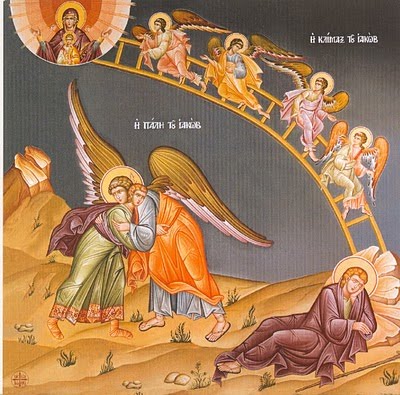
The Holy Scriptures speak of thee mystically, O Mother of the Most High. For Jacob[13] saw in days of old the ladder that prefigured thee, and said: ‘This is the stair on which God shall tread.’ Therefore, as is meet, dost thou hear the salutation: ‘Hail, thou who art full of grace: the Lord is with thee.’
The bush and the fire showed a strange marvel to Moses, the initiate in sacred things.[14] Seeking its fulfillment in the course of time, he said: ‘I shall observe it brought to pass in the pure Virgin. To her as Theotokos shall the salutation come: Hail, thou who art full of grace: the Lord is with thee.’
Daniel called thee a spiritual mountain; Isaiah, the Mother of God; Gideon saw thee as a fleece and David called thee sanctuary; another called thee gate.[15] And Gabriel in his turn cries out to thee: ‘Hail, thou who art full of grace, the Lord is with thee.’
(Katavasia) Let no profane hand touch the living Ark of God …
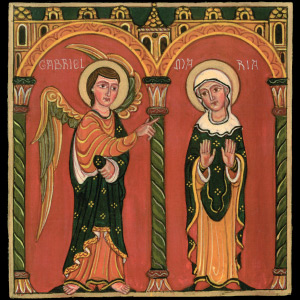
From The Festal Menaion translated by Mother Mary and Archimandrite Kallistos Ware (Faber and Faber: 1984)

